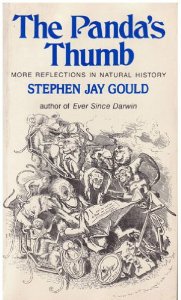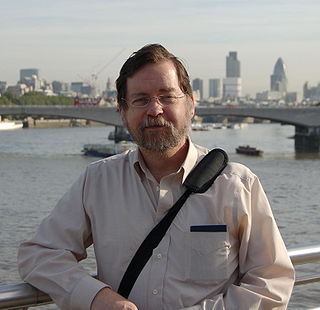Related Research Articles

Stephen Jay Gould was an American paleontologist, evolutionary biologist, and historian of science. He was one of the most influential and widely read authors of popular science of his generation. Gould spent most of his career teaching at Harvard University and working at the American Museum of Natural History in New York. In 1996, Gould was hired as the Vincent Astor Visiting Research Professor of Biology at New York University, after which he divided his time teaching between there and Harvard.
The argument from poor design, also known as the dysteleological argument, is an argument against the assumption of the existence of a creator God, based on the reasoning that any omnipotent and omnibenevolent deity or deities would not create (say) organisms with the perceived suboptimal designs that occur in nature.

The Center for Science and Culture (CSC), formerly known as the Center for the Renewal of Science and Culture (CRSC), is part of the Discovery Institute (DI), a conservative Christian think tank in the United States. The CSC lobbies for the inclusion of creationism in the form of intelligent design (ID) in public-school science curricula as an explanation for the origins of life and the universe while trying to cast doubt on the theory of evolution. These positions have been rejected by the scientific community, which identifies intelligent design as pseudoscientific neo-creationism, whereas the theory of evolution is overwhelmingly accepted as a matter of scientific consensus.

Darwin's Black Box: The Biochemical Challenge to Evolution is a book by Michael J. Behe, a professor of biochemistry at Lehigh University in Pennsylvania and a senior fellow of the Discovery Institute's Center for Science and Culture. In the book Behe presents his notion of irreducible complexity and argues that its presence in many biochemical systems therefore indicates that they must be the result of intelligent design rather than evolutionary processes. In 1993, Behe had written a chapter on blood clotting in Of Pandas and People, presenting essentially the same arguments but without the name "irreducible complexity," which he later presented in very similar terms in a chapter in Darwin's Black Box. Behe later agreed that he had written both and agreed to the similarities when he defended intelligent design at the Kitzmiller v. Dover Area School District trial.

Of Pandas and People: The Central Question of Biological Origins is a controversial 1989 school-level supplementary textbook written by Percival Davis and Dean H. Kenyon, edited by Charles Thaxton and published by the Texas-based Foundation for Thought and Ethics (FTE). The textbook endorses the pseudoscientific concept of intelligent design – the argument that life shows evidence of being designed by an intelligent agent which is not named specifically in the book, although proponents understand that it refers to the Christian God. The overview chapter was written by young Earth creationist Nancy Pearcey. They present various polemical arguments against the scientific theory of evolution. Before publication, early drafts used cognates of "creationist". After the Edwards v. Aguillard Supreme Court ruling that creationism is religion and not science, these were changed to refer to "intelligent design". The second edition published in 1993 included a contribution written by Michael Behe.
Quoting out of context is an informal fallacy in which a passage is removed from its surrounding matter in such a way as to distort its intended meaning. Contextomies may be either intentional or accidental if someone misunderstands the meaning and omits something essential to clarifying it, thinking it to be non-essential. As a fallacy, quoting out of context differs from false attribution, in that the out of context quote is still attributed to the correct source.

The Panda's Thumb: More Reflections in Natural History (1980) is a collection of 31 essays by the Harvard University paleontologist Stephen Jay Gould. It is the second volume culled from his 27-year monthly column "This View of Life" in Natural History magazine. Recurring themes of the essays are evolution and its teaching, science biography, probabilities and common sense.

Eight Little Piggies (1993) is the sixth volume of collected essays by the Harvard paleontologist Stephen Jay Gould. The essays were selected from his monthly column "The View of Life" in Natural History magazine, to which Gould contributed for 27 years. The book deals, in typically discursive fashion, with themes familiar to Gould's writing: evolution and its teaching, science biography, probabilities and common sense.
The Panda's Thumb may refer to:
Nicholas J. Matzke is the former Public Information Project Director at the National Center for Science Education (NCSE) and served an instrumental role in NCSE's preparation for the 2005 Kitzmiller v. Dover Area School District trial. One of his chief contributions was discovering drafts of Of Pandas and People which demonstrated that the term "intelligent design" was later substituted for "creationism". This became a key component of Barbara Forrest's testimony. After the trial he co-authored a commentary in Nature Immunology, was interviewed on Talk of the Nation, and was profiled in Seed as one of nine "revolutionary minds".
Creationism's Trojan Horse: The Wedge of Intelligent Design is a 2004 book by Barbara Forrest and Paul R. Gross on the origins of intelligent design, specifically the Discovery Institute's Center for the Renewal of Science and Culture and its wedge strategy. The authors are highly critical of what they refer to as intelligent design creationism, and document the intelligent design movement's fundamentalist Christian origins and funding.
Pharyngula, a blog founded and written by PZ Myers, is hosted on ScienceBlogs and on FreeThoughtBlogs (2011–present). In 2006 the science journal Nature listed it as the top-ranked blog written by a scientist based on popularity. The blog addresses a range of topics, including Myers's academic specialty, biology. It has become particularly well known for Myers's writing style and for his criticism of intelligent design and creationism. In 2009, Hemant Mehta ranked Pharyngula the most popular atheist blog, based on subscriber levels and other factors.

Koinophilia is an evolutionary hypothesis proposing that during sexual selection, animals preferentially seek mates with a minimum of unusual or mutant features, including functionality, appearance and behavior. Koinophilia intends to explain the clustering of sexual organisms into species and other issues described by Darwin's Dilemma. The term derives from the Greek word koinos meaning "common" or "that which is shared", and philia, meaning "fondness".

The Discovery Institute has conducted a series of related public relations campaigns which seek to promote intelligent design while attempting to discredit evolutionary biology, which the Institute terms "Darwinism." The Discovery Institute promotes the pseudoscientific intelligent design movement and is represented by Creative Response Concepts, a public relations firm.

This timeline of intelligent design outlines the major events in the development of intelligent design as presented and promoted by the intelligent design movement.

The Edge of Evolution: The Search for the Limits of Darwinism is an intelligent design book by Discovery Institute fellow Michael Behe, published by the Free Press in 2007. Behe argues that while evolution can produce changes within species, there is a limit to the ability of evolution to generate diversity, and this limit is somewhere between species and orders. On this basis, he says that known evolutionary mechanisms cannot be responsible for all the observed diversification from the last universal ancestor and the intervention of an intelligent designer can adequately account for much of the diversity of life. It is Behe's second intelligent design book, his first being Darwin's Black Box.

The Biologic Institute was a section of the Discovery Institute created to give the organization a facade of conducting biological research with the aim of producing experimental evidence of intelligent design creationism, funded by the Discovery Institute. It claimed offices in Redmond, Washington and laboratories in the Fremont neighborhood of Seattle, Washington. Instead Biologic Institute consisted solely of a rented office space in Redmond which is no longer in use for several years although the web domain is still renewed. The 'research' listed for the group consists mainly of random and often irrelevant works by Intelligent Design supporters going back to their graduate school years. Several are notably articles, books or internally published content from Discovery's 'BioComplexity' journal which is not a legitimate scientific journal.

Paul Zachary Myers is an American biologist who founded and writes the Pharyngula science-blog. He is associate professor of biology at the University of Minnesota Morris (UMM) where he works in the field of developmental biology. He is a critic of intelligent design and the creationist movement and other pseudoscientific concepts.
Mark J. Pallen is a Research Leader at the Quadram Institute and Professor of Microbial Genomics at the University of East Anglia. In recent years, he has been at the forefront of efforts to apply next-generation sequencing to problems in microbiology and ancient DNA research.
References
- ↑ "Top five science blogs". Nature . 442 (7098): 9. 2006. Bibcode:2006Natur.442....9.. doi: 10.1038/442009a . S2CID 4385021 . Retrieved 2006-12-14.
- ↑ Pallen, Mark (2011). The Rough Guide to Evolution. Rough Guides. Penguin. p. 467. ISBN 9781409358572.
- ↑ Gould, S. J. (1978). "The panda's peculiar thumb." Natural History 87 (Nov.): 20–30.